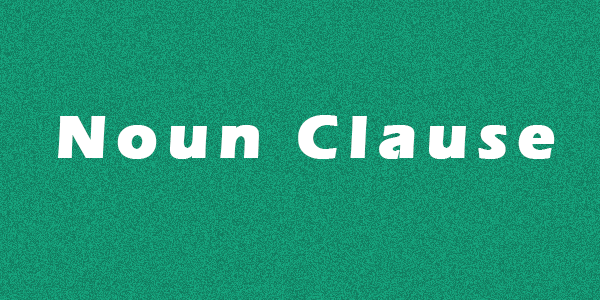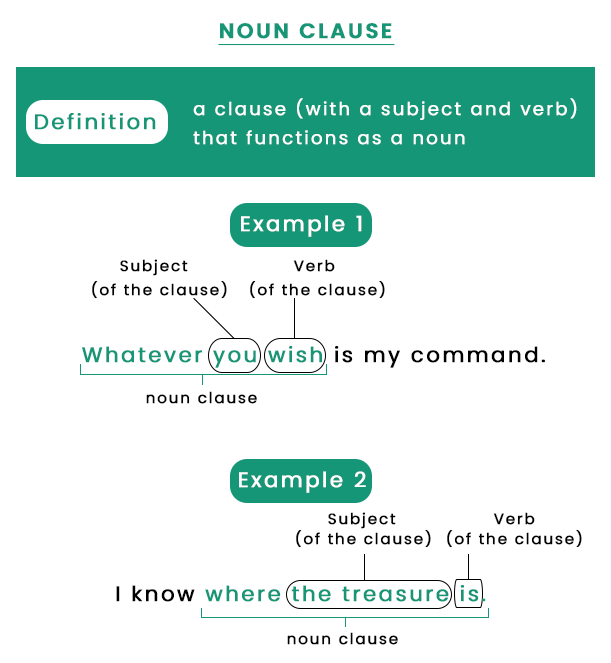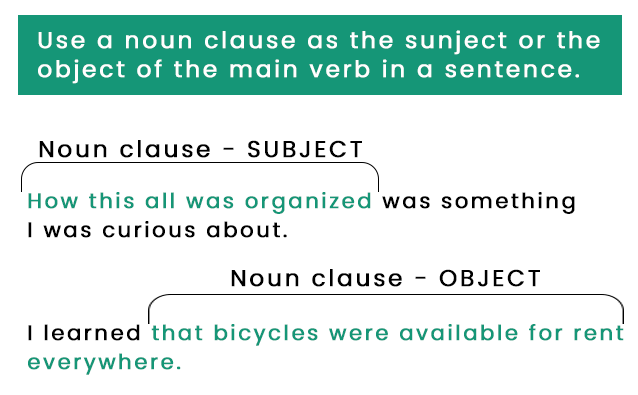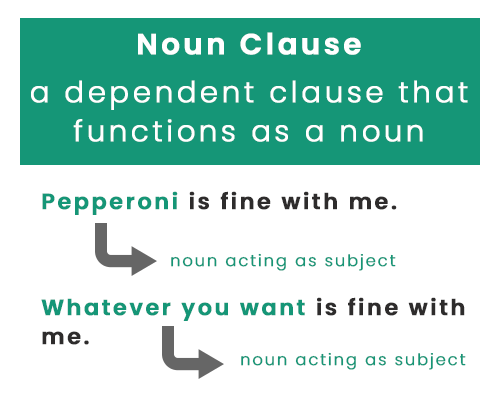Noun ClauseMost individuals are familiar with the concept of a noun, but they may be less certain about the noun clause. A noun clause is a combination of words that serves as the noun. These clauses are always reliant on one another. In simpler terms, they do not constitute a whole sentence. Examine these sample sentences with noun clauses to better grasp their purpose and function. 
What Exactly Is a Noun Clause?A noun clause refers to the clause (a set of words that includes a subject and a verb) which functions as the noun in a statement. Nouns are English words that refer to individuals, locations, or objects. A noun clause serves the same purpose as the nouns in a sentence. It comes after a connecting or copular verb to define or change the sentence's subject. Noun clauses, unlike noun phrases, comprise both a subject and a verb. Examples of noun clauses include :
The noun clauses that are high-lighted are the dependent clauses. They cannot exist alone as whole sentences, unlike independent clauses. Noun clauses are utilised to fill in the blanks in a sentence. If you are not confident whether a clause is a noun clause, consider substituting other nouns or pronouns for it. As an example:
When it comes to making a statement clear, noun clauses are essential. You've spotted a noun clause if you can effectively substitute the clause with a pronoun. These sentences, however, are far less intriguing and comprehensive than the original ones. The Function of Noun ClausesNoun clauses are dependent clauses which cannot stand on their own as coherent sentences. Noun clauses comprise of the subject and the verb but only serve as nouns. (Adverb clauses and adjective clauses serve as adjectives and adverbs, respectively.) Noun clauses have to be part of a bigger sentence to make a complete notion in English grammar. In the sentence "She appreciated that she was always early," for example, the noun clause "that she was always early" cannot stand on its own. A noun or a pronoun can replace a noun phrase. Consider the following phrase: "Did you understand what the speaker said?" You can use "it" or "that" for the noun phrase "what the speaker said," as in "Did you understand that?" How to Recognize a Noun ClauseNoun clauses can appear practically anywhere in a sentence, making them difficult to identify. One of the simplest methods to identify a noun clause is to look for the following words:
While these terms might appear in sentences other than noun clauses, they almost invariably begin with one of them. They provide an additional hint for locating a noun clause in a sentence. What Is the Distinction Between a Noun Clause and a Noun Phrase?A noun clause encompasses of a noun and a verb. A noun phrase is a string of words that contains a noun but no verb. In other terms, a noun clause, like a sentence, includes a subject and a predicate, but since it is dependent, it does not communicate a complete notion. The grammatical functions of a noun clause and a noun phrase are equivalent, but the composition is distinct. Consider this: "The audience ignored what the heroine did in the first half of the movie." The sentence "what the heroine did in the first part of the movie" has a subject and a verb. So it is a noun clause in this statement. 
3 Tips That Can Help You Better Understand Noun ClausesHere are some helpful tips for understanding Noun Clauses : Tip 1 - Noun Clauses may substitute any noun in a statement, inclusive of the subject, object, and complement . As an example : Nobody knows why he is terrified of snakes . Tip 2- Noun clauses are placeholders, not modifiers . As an example : Noun Clause (serving as the subject): When he will reach depends on the flight. Adverbial Clause (serving as the adverb): Whenever she reaches, we will have our meal . As you can see, these many sorts of dependent clauses are often confused with one another. Just ask the following questions to determine whether a clause is adverbial or nominal (noun) . A noun clause is one that answers the inquiry, "who?" or "what? " Tip 3: Interrogative pronouns or expletives are always used to commence noun clauses . As an example : The puppy did not understand what would make his journey any more wonderful. The underlined clause in the preceding sentence commences with the interrogative pronoun, what, transforming it into a real noun clause that serves as the direct object of the verb, understand. Noun clauses can also start with expletives (not bad words!). Expletives are terms in grammar that serve no grammatical purpose in a statement other than to announce the beginning of a noun phrase. Popular expletives include that, whether, and if. Although the expletive is required for an understanding of the noun clause, it serves no grammatical significance in the sentence other than to link the noun clause to the verb pondered. Types of Noun ClausesAfter you've identified a noun clause, understand how to establish its role inside the sentence. Evaluate few of the most common noun clause roles. The Subject of A SentenceA noun clause may function as a sentence's subject. The noun clause themselves serve or perform the action in the sentence . As an example:
It's natural to presume that the subject of these sentences is Alex, Melissa, and the kid. However, this is not entirely right. To identify the noun clauses, ask or raise these questions.
The noun clauses which serve as the subjects of a sentence might be longer or shorter. However, please remember that a particularly long noun clause as a subject may be misleading to the audience. The Object of A VerbNoun clauses, similar to all nouns, can function as the direct objects of a verb. They come after verbs to inform the readers where the action is headed. As an example :
You can also use the questioning technique to show how the noun clause is employed as a direct object here. These are the same questions that would be used to locate any direct object.
Replace the term it with each noun clause. Since each direct object is a noun clause, each sentence remains relevant . Subject ComplementThe noun clauses may also function as a subject complements. A subject complement alters, defines, or finishes a clause's subject. Predicate nominatives and predicate nouns are other terms for subject complements.
Do you notice how these noun phrases respond to questions and connect to the subject?
These noun clauses give additional details about the sentence's subjects. Not only noun clauses, but all subject complements are affected by this. Take note that a verb is a one of the forms of to be in every case. 
Objects of a PrepositionIn prepositional phrases, noun clauses also serve as the objects of the preposition. The prepositions "of" and "for" are used in the instances below .
Again, asking the right questions is the greatest approach to grasping this concept .
Each one of these sentences may stand alone without the prepositions. On the other hand, the prepositions are inserted to provide additional detail, and the noun clauses serve as the objects of all these prepositions. Adjectival ComplementFinally, the noun clauses may also serve the adjective complements. These noun clauses are used to supplement an adjective or adverb .
The adjective complements provide additional information about the preceding adjective or adverb.
Each of these sentences, like the examples with prepositions, might be completed after the adjective. The adjective complement also add more information, and in every case, the adjective complement are known as the noun clause. How Do You Construct a Noun Clause?The noun clauses must include the below- mentioned items :
These are the three components required to make a noun clause . Subordinating conjunction + subject + verb + other components = structure I don't know what you like . Subject = you Verb = like Subordinating conjunction = what Subordinating conjunction = how Note: In a noun clause, don't make the error of putting the verb prior to the subject. This is a frequent thing if the noun clauses are the components of the interrogative sentences .

Why Is It Necessary To Use A Noun Clause In English?Why should we utilize a noun clause when we already have a noun and a noun phrase? The fundamental point of using a noun clause is indirectly mentioning something or someone. To refer to a name, we utilize noun clauses. A noun clause is used in two different contexts :
Simple Noun Clause ExamplesHere are some simple noun clause examples. The noun clause is Italicized in every mentioned sentence, the subjects of the clauses are highlighted, and the verbs of the noun clauses have been underlined.
(Usually, the subject of the noun phrase is the beginning word (i.e., "how," "that," or the "wh"-word. ) Some Important Points to RememberSelect the appropriate conjunction between WHO and WHOM . The term who is the subject of the verb, while the term whom is the object of a verb and the preposition . Although WHOM cannot be used as a subject, it can and is commonly utilized as the object of a verb or a preposition in modern English. The term WHOM is at the risk of becoming outdated. Who danced with me last night- Correct I don't remember who you like - Correct Some may find it strange to use THAT as a subject at the start of a noun phrase . That he never danced is shocking . The fact that he never danced is shocking . Clauses Make Sentences IntriguingNoun clauses act in the same way that a one-word noun does. They are excellent sentence extensions when you want to convey more information while also varying your sentence structure. The concept is easy to grasp. Try putting it to use on a regular basis for better understanding.
Next TopicNoun Clause Examples
|
 For Videos Join Our Youtube Channel: Join Now
For Videos Join Our Youtube Channel: Join Now
Feedback
- Send your Feedback to [email protected]
Help Others, Please Share










